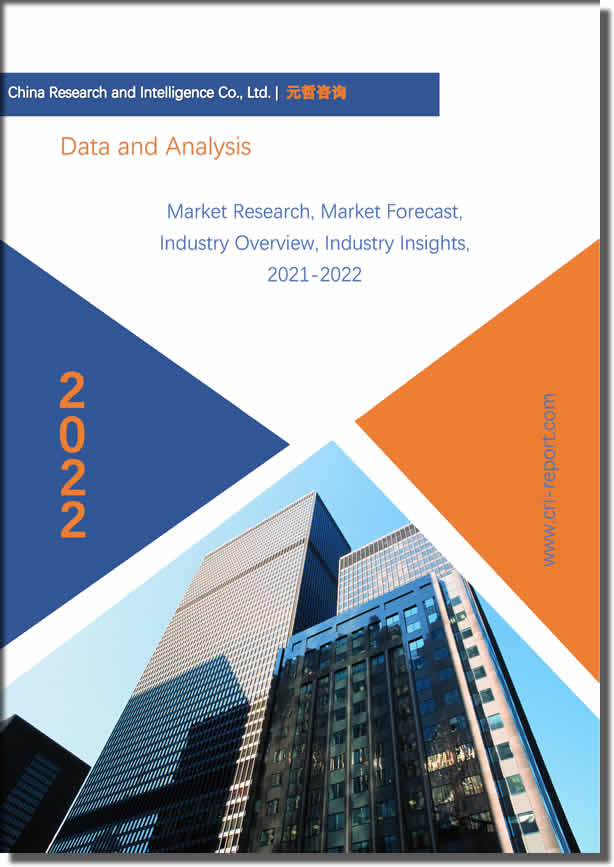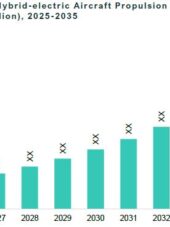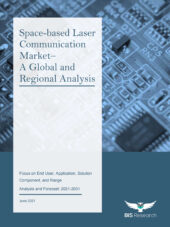Description
Market Report Coverage – Satellite Earth Observation Market
Market Segmentation
• Services: Earth Observation (EO) Data and Value-Added Services
• Technology: Synthetic Aperture Radar (SAR), Optical, and Others
• Altitude: Low Earth Orbit (LEO), Medium Earth Orbit (MEO), and Geosynchronous Earth Orbit (GEO)
• Application: Data Acquisition and Mapping, Sustainable Development and Environment Management, Disaster Management, Surveillance and Security, Location-Based Service, and Others
• End User: Government and Defense, Archaeology and Civil Infrastructure, Energy and Natural Resources, Agriculture, Forestry, Maritime and Fishery, and Others
Regional Segmentation
• North America – U.S. and Canada
• Europe – Germany, U.K., France, Russia, and Rest-of-Europe
• Asia-Pacific – Japan, China, South Korea, India, and Rest-of-Asia-Pacific
• Rest-of-the-World – Middle East and Africa, Latin America
Market Growth Drivers
• Growing Demand for Big Data to Generate Accurate Insights on Earth Observation Data
• Rising Investment Activities for Developing Cost-Efficient Earth Observation Satellites and Instruments
Market Challenges
• Unfavourable Government Regulations Worldwide for Earth Observation Satellites
• Difficulty in Integration of Data Analytics Tools with Enterprise Solution
Market Opportunities
• Growing Demand for Geospatial Analytical Services in Vertical Market
• Increasing Demand for Earth Observation Satellite among Developing Nations
Key Companies Profiled
Airbus S.A.S, BAE Systems, Ball Corporation, BlackSky Technology Inc., Capella Space, EarthDaily Analytics (UrtheCast), Geospatial Insight, HawkEye 360, Inc., ICEYE, Kongsberg Satellite Services (KSAT), L3Harris Technologies, Inc., Maxar Technologies Inc., MDA Ltd., OHB System AG (OHB SE), Orbital Insight, Inc., Planet Labs, RS Metrics, Satellogic, Skylab Analytics, Spire Global, Inc., Thales Alenia Space, GHGSAT
How This Report Can Add Value
This report will help with the following objectives:
• A dedicated section focusing on the futuristic trends adopted by the key players operating in the global satellite Earth observation market.
• Extensive competitive benchmarking of top 20 players (including OEMs and service providers) offering a holistic view of the global satellite Earth observation landscape.
• Imagery pricing analysis has also been covered in this report.
• Qualitative and quantitative analysis of satellite Earth observation at the region and country-level granularity by application and product segments.
Product/Innovation Strategy: The product segment helps the reader in understanding the different types of satellite Earth observation and their market potentials globally. Moreover, the study provides the reader a detailed understanding of satellite earth observation with respect to services, manufacturing, and altitude.
Recent Developments in Satellite Earth Observation Market
• In October 2021, Maxar Technologies won a contract from National Geospatial Agency (NGA) for providing high-resolution imagery data for the U.S. defense department.
• In November 2021, ICEYE signed a contract with the National Oceanic and Atmospheric Administration (NOAA) to support the response and monitoring of environmental hazards in the maritime sector.
• In January 2022, Capella Space signed a contract with the National Reconnaissance Office (NRO) for the demonstration of its synthetic aperture radar (SAR) imagery capabilities. Under this contract, the company will provide synthetic aperture radar data simulation and modeling, theater downlink downstream, regional imagery demonstration, and data imagery services.
Key Questions Answered in the Report
• What are the futuristic trends in the satellite Earth observation market, and how is the market expected to change over the forecast years 2022-2032?
• What are the key drivers and challenges faced by the companies that are currently working in the global satellite Earth observation market?
• How is the satellite Earth observation market expected to grow during the forecast period 2022-2032?
• What are the opportunities for the companies to expand their businesses in the global satellite Earth observation market?
• Which region is expected to lead the global satellite Earth observation market by 2032?
• What are the key developmental strategies implemented by the key players to sustain in this highly competitive market?
• What is the current and future revenue scenario of the satellite Earth observation market?
• What is the competitive scenario of the key players in the global satellite Earth observation market?
• What are the emerging technologies that the key companies are focusing on to increase their market share?
• What are the strengths and weaknesses of the companies that are influencing the growth of the market?
Satellite Earth Observation
The satellite Earth observation era began many years ago in 1957 with the launch of Sputnik 1, which orbited the Earth after every 96 minutes and transmitted the radio signals received from the earth. Post this, many satellites were launched, including TIROS-1 in 1960, which successfully entered the atmosphere and produced footage of weather through space.
Earth observation satellites are basically equipped with payloads that are used to capture data about the characteristics of Earth. The captured data is then processed and analyzed to extract information that can serve various types of applications and end-users.
Currently, many space agencies and commercial companies across the globe have been focusing on Earth observation missions.
Satellite Earth Observation Industry Overview
The global satellite Earth observation data and value-added services market is expected to reach $15,903.0 million by 2032, with a CAGR of 6.92% during the forecast period 2022-2032. The Earth observation data and service market has been witnessing a high growth rate owing to significant demand for applications such as disaster management, agriculture, cartography, and natural resources survey.
Market Segmentation
Satellite Earth Observation Market by End User
The government and defense end-user segment is estimated to dominate the global satellite Earth observation market due to the increasing demand for accurate weather forecasting, Earth imagery, and other activities.
Satellite Earth Observation Market by Application
The sustainable development and environment management application is expected to be the front runner in the global satellite earth observation market due to the ability of data and services to cater information regarding wildlife trends, land use patterns, tracking biodiversity, and managing natural resources among others; and help in attaining social, environmental, and economic sustainability.
Satellite Earth Observation Market by Services
Value-Added Services (VAS) is the most prominent service contributing toward the growth of the global satellite earth observation market. Earth observation satellite VAS market consists of companies that acquire the images from the midstream players and exploit the technology to provide space-related service to the final customers.
Satellite Earth Observation Market by Technology
Optical technology in satellites is used in the fields of urban planning, agriculture, and damage assessment after natural hazards, among others. Optical satellites have sensors that use near-infrared radiation and visible light to gather data. These are nadir viewing instruments that have a horizontal spatial resolution, ranging from 1-300 meters. This is expected to generate huge demand for optical technology.
Satellite Earth Observation Market by Region
North America is expected to account for the highest share of the global satellite Earth observation market, owing to a significant number of companies based in the region, increased spending by government and commercial organizations such as the National Aeronautics and Space Administration (NASA), Maxar Technologies, and Planet Labs for Earth observation data and services.
Key Market Players and Competition Synopsis
The companies that are profiled in the report have been selected post undergoing in-depth interviews with experts and understanding details around companies such as product portfolios, annual revenues, market penetration, research and development initiatives, and domestic and international presence in the satellite Earth observation market.
Some of the leading players currently in this market include companies such as Airbus S.A.S, BAE Systems, Ball Corporation, BlackSky Technologies, Capella Space, EarthDaily Analytics (UrtheCast), Geospatial Insight, HawkEye 360, ICEYE, Kongsberg Satellite Services (KSAT), L3 Harris Technologies, Maxar Technologies, RS Metrics, Satellogic, Spire Global, among others.
Related Reports: Satellite PNT Technology Market (Position, Navigation, and Timing Technology Market ) – A Global and Regional Analysis: Focus on Application, End User, Component, and Country – Analysis and Forecast, 2021-2031
Related Reports: Global Optical Satellite Communication Market Analysis and Forecast Report 2030
Related Reports: Satellite Flat Panel Antenna Market – A Global and Regional Analysis: Focus on End-User, Type, Frequency, and Country – Analysis and Forecast, 2021-2031
Related Reports: Satellite Communication (SATCOM) Market Research Report – Forecast till 2027
Related Reports: Satellite Broadband Communication in Public Safety Market Size Attractiveness Analysis and Key Investment Opportunity and Forecast to 2030
Related Reports: LEO-focused Satellite Propulsion Technology Market – A Global and Regional Analysis: Focus on End User, Application, Propulsion Type, Satellite Mass, Component, Orbit, Propellant Type and Country – Analysis and Forecast, 2021-2031
Related Reports: Satellite Command and Control System Market – A Global and Regional Analysis: Focus on Application, End User, Solution, Satellite Mass, Frequency Band, Orbit and Country – Analysis and Forecast, 2021-2031
Related Reports: Hybrid-Satellite Cellular Terminal Market – A Global and Regional Analysis: Focus on End User, Platform, Frequency Band, and Service – Analysis and Forecast, 2021-2031






Reviews
There are no reviews yet.